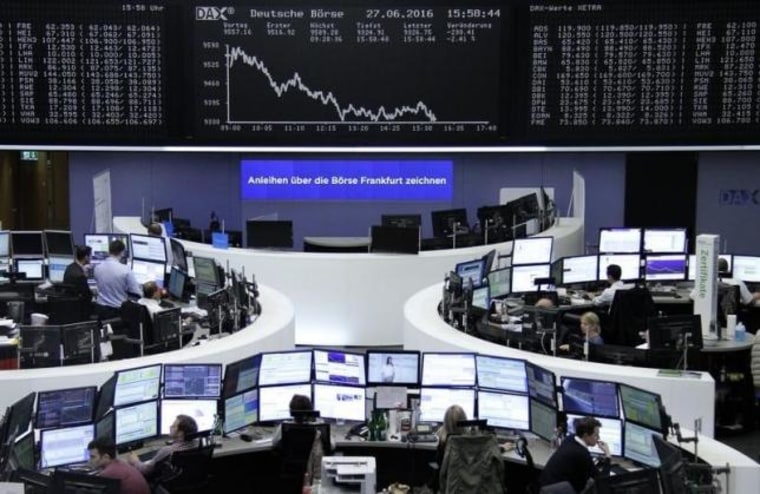World stocks rose for the first time in three days and sterling and the euro climbed on Tuesday, as investors made a rush for Brexit-bashed assets hammered by some of the biggest falls since the 2008 collapse of Lehman Brothers.
Bargain hunting trumped still widespread uncertainty over Britain's vote to leave the European Union, as the bloc's leaders, including soon-to-be-ex UK Prime Minister David Cameron, headed for their first post-vote meeting in Brussels.

European shares jumped 2.4 percent in early trading having plunged over 10 percent since Friday.
Banks and insurers, which have suffered the most in the rout, led the fightback. Barclays jumped 6.3 percent, Deutsche Bank climbed 3.5 percent, Credit Agricole and Italy's UniCredit were both up 7 percent and Spain's Bankia jumped 9.5 percent.
Battered sterling also got a reprieve. It rose 0.8 percent to $1.3335 following the biggest two-day slide in the post-1973 era of floating exchange rates, which saw it slump to a 31-year low of $1.3122 on Monday.
Against the yen, sterling rose 1 percent to 135.54 while the euro nudged up versus the dollar to $1.1075 having dropped to a three-month low of $1.0912 after the British vote.
"After a few days of a lot of volatility, it looks like we have found some stability," said TD Securities' European Head of Currency Strategy Ned Rumpeltin.
"People will now need to see a bit more on the big questions such as what is the timeline for the UK withdrawal and what are the effects going to be for the global economy."
The major concern for investors — aside from the political ramifications of a split EU — is whether already struggling banks can survive if Brexit prompts central banks in Europe, Switzerland, Scandinavia and Japan to cut interest rates even more deeply into negative territory.
The cost of insuring against European banks default hit a four-month high on Monday and traders will be watching closely for signals from ECB chief Mario Draghi, who will also attend the summit in Brussels later.
In a speech in Portugal Draghi said central banks around the world should aim to align their monetary policies to mitigate "destabilizing spillovers" between economies.
Risk appetite was also beginning to resurface in bond markets. Yields on UK government bonds, known as Gilts, and German Bunds nudged up having both hit record lows in the days since the Brexit vote, while yields in lower rated Spain, Italy and Portugal all fell more than 8 basis points.
The move in Gilts also came after rating agency Standard and Poor's stripped the UK of its prized AAA rating with a hefty two-notch downgrade. It was the first time it had ever made such a deep cut to a top-rated sovereign.
Moody's meanwhile will downgrade the rating outlooks for major British banks to "negative" on Tuesday because of the fallout from the vote to leave the EU, Sky News reported, citing sources.
Overnight in Asia, MSCI's broadest index of Asia-Pacific shares outside Japan ended up 0.5 percent. Japan ended flat after an impressive turnaround from an earlier fall of more than 3 percent.
Policymakers from Japan to China vowed to protect their economies and markets from the destabilizing impact of Brexit.
"It's hard to avoid short-term volatility in China's capital markets, but we won't allow roller-coaster rides and drastic changes in the capital markets," Premier Li Keqiang said at the World Economic Forum (WEF) in the city of Tianjin.
Early signs of a cautious return in demand for riskier assets were evident in the high-yielding Aussie and the New Zealand dollars, which helped put a floor under other emerging market currencies in Asia.
Gold, one of the rare outliers in global financial markets in the last few days, saw some profit-taking, with the precious metal down 0.7 percent. Silver fell 0.3 percent.
Crude oil prices regained some ground after tumbling nearly 3 percent on Monday.